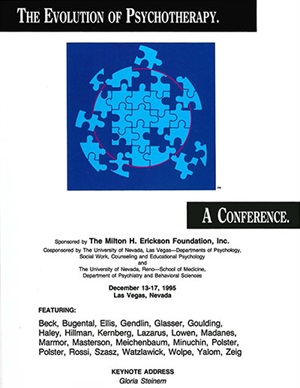
- Average Rating:
- Not yet rated
- Topic Areas:
- Invited Addresses | History of Psychotherapy | Psychotherapy
- Categories:
- Evolution of Psychotherapy | Evolution of Psychotherapy 1995
- Faculty:
- Judd Marmor | Jay Haley, MA
- Duration:
- 1 Hour 28 Minutes
- Format:
- Audio Only
- Original Program Date:
- Dec 14, 1995
- Short Description:
- The author traces the evolution of psychodynamic theory over the past fifty years and demonstrates how various individuals and schools of thought have contributed to increasing conceptual clarity despite significant continuing differences. Along with these theoretical advances, there have been important changes in analytically-oriented therapeutic techniques.
- Price:
- $15.00 - Base Price
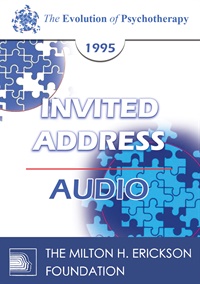
- Average Rating:
- Not yet rated
- Topic Areas:
- Invited Addresses | Psychoanalysis | Anxiety | Psychotherapy | Research
- Categories:
- Evolution of Psychotherapy | Evolution of Psychotherapy 1995
- Faculty:
- Albert Ellis, PhD | Joseph Wolpe, M.D.
- Duration:
- 1:31:10
- Format:
- Audio Only
- Original Program Date:
- Dec 14, 1995
- Short Description:
- In the early decades of the 20th century Freud's mastery of the craft of presenting a case enthroned a belief that anxiety disorders were caused by repressed emotional complexes and that recovery required the restitution of repressed ideas. This belief dominated psychotherapeutic practice, and even though little was to be seen in the way of success, any alternative was treated with scorn. Mid-century studies of experimental neuroses showed that these disturbances were the consequence of the learning of maladaptive anxiety and could be overcome by systematic counteraction by other emotions.
- Price:
- $15.00 - Base Price
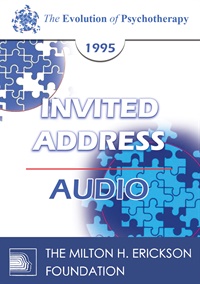
- Average Rating:
- Not yet rated
- Topic Areas:
- Invited Addresses | Psychoanalysis | Psychotherapy
- Categories:
- Evolution of Psychotherapy | Evolution of Psychotherapy 1995
- Faculty:
- Otto Kernberg, MD | Thomas Szasz, MD
- Duration:
- 1 Hour 25 Minutes
- Format:
- Audio Only
- Original Program Date:
- Dec 16, 1995
- Short Description:
- The major emphasis in contemporary psychoanalytic psychotherapy is on the early and consistent interpretation of the transference. A growing attention to countertransference analysis, to the risk of "indoctrinating" patients, to character analysis, to the analysis of unconscious meanings in the "here and now" also are dominant trends. Significant controversies continue regarding the importance of the "real" relationship, the therapeutic versus the resistant aspects of regression, the role of empathy, and the relation of historical to narrative truth.
- Price:
- $15.00 - Base Price
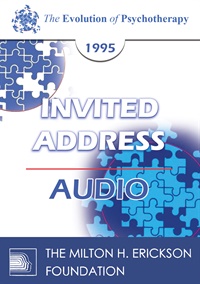
- Average Rating:
- Not yet rated
- Topic Areas:
- Invited Addresses | Psychotherapy | History of Psychotherapy | Therapist Development
- Categories:
- Evolution of Psychotherapy | Evolution of Psychotherapy 1995
- Faculty:
- James Bugental, PhD | Erving Polster, PhD
- Duration:
- 1 Hour 19 Minutes
- Format:
- Audio Only
- Original Program Date:
- Dec 16, 1995
- Short Description:
- For the past half-century there has been a remarkable and continual evolution in the theory and practice of psychotherapy. Now that evolution shows signs of becoming a revolution. Many elements of these changes are, as yet, only scantily represented in the literature, but they are the stuff of bull sessions, the more liberated case conferences and solitary, sometimes fearful, experimentations. This transition comes about from a variety of influences, among which three are particularly worthy of examination for what they suggest about what is likely to emerge a half-century from now.
- Price:
- $15.00 - Base Price

- Average Rating:
- Not yet rated
- Topic Areas:
- Invited Addresses | Psychotherapy | Therapist Development
- Categories:
- Evolution of Psychotherapy | Evolution of Psychotherapy 1995
- Faculty:
- Paul Watzlawick, PhD | James F. Masterson, MD
- Duration:
- 1 Hour 28 Minutes
- Format:
- Audio Only
- Original Program Date:
- Dec 16, 1995
- Short Description:
- The traditional assumption that only insight into the causes in the past can bring about a change in the present makes us blind for what Alexander & French called "the corrective emotional experience," i.e., chance events in the present that may lead to almost immediate solutions. A great number of Erickson's surprising results could be considered the outcome of "planned chance events," often in the form of behavior prescriptions similar to interventions in hypnotherapy (e.g., "speaking the clients's language," prescribing resistance, the use of reframing, paradoxical interventions, etc.).
- Price:
- $15.00 - Base Price
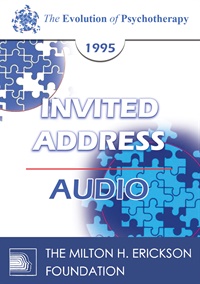
- Average Rating:
- Not yet rated
- Topic Areas:
- Invited Addresses | Family Therapy | Supervision | Therapist Development
- Categories:
- Evolution of Psychotherapy | Evolution of Psychotherapy 1995
- Faculty:
- Salvador Minuchin, MD | Jeffrey Zeig, PhD
- Duration:
- 1:07:40
- Format:
- Audio Only
- Original Program Date:
- Dec 16, 1995
- Short Description:
- Supervision and therapy are isomorphic processes. What supervision teaches is the process of creating change in people, and the very teaching of this process is itself an attempt to create change in the supervisee. Like families, therapists tend to confine themselves to selected segments of their possible repertory. Thus a major goal of supervision can be the expansion of the therapist's use of self.
- Price:
- $15.00 - Base Price
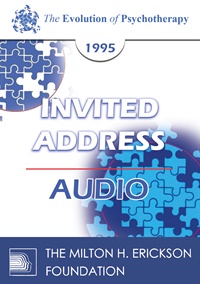
- Average Rating:
- Not yet rated
- Topic Areas:
- Invited Addresses | Existential Therapy | Therapeutic Relationship | Psychotherapy
- Categories:
- Evolution of Psychotherapy | Evolution of Psychotherapy 1995
- Faculty:
- Irvin Yalom, PhD | Miriam Polster
- Duration:
- 1:22:53
- Format:
- Audio Only
- Original Program Date:
- Dec 16, 1995
- Short Description:
- Existential psychotherapy is more properly viewed as a therapy informed by a sensibiity to existential issues, rather than as a discrete, self-contained school of therapy. It addresses the anxiety embedded in our consciousness of the parameters of existence, especially in our confrontation with death, meaninglessness, freedom, and isolation. I shall discuss these concerns, particularly those with the greatest relevance to everyday therapy practice. I shall discuss the implications of the existential sensibility for the conduct of therapy and the therapeutic relationship. Genuineness and authenticity are necessary.
- Price:
- $15.00 - Base Price
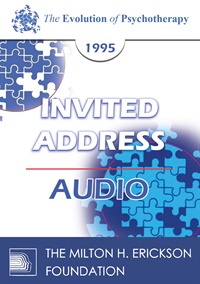
- Average Rating:
- Not yet rated
- Topic Areas:
- Invited Addresses | Focusing | Mind-Body | Psychotherapy
- Categories:
- Evolution of Psychotherapy | Evolution of Psychotherapy 1995
- Faculty:
- Eugene Gendlin, PhD | James Hillman, PhD
- Duration:
- 1 Hour 27 Minutes
- Format:
- Audio Only
- Original Program Date:
- Dec 16, 1995
- Short Description:
- Focusing is bodily attention, not to mere sensations but to an at first unclear, implicitly complex bodily sense-of a situation, problem, or aspect of life. Therapy deepens immediately with many clients if asked what physical sense comes in the middle of the body in relation to what is being worked on. With half a minute of repeated direct attention, clients can assign a "quality-word," e.g., "heavy," "fluttery," or "tight." Then small steps come to say the crux of the problem. Each brings a slight (later large) "shift" and release, a direct sense of validity, although further steps may again change the whole problem.
- Price:
- $15.00 - Base Price
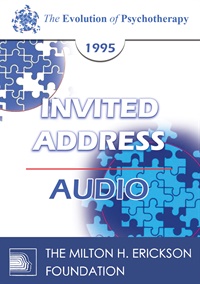
- Average Rating:
- Not yet rated
- Topic Areas:
- Invited Addresses | Psychotherapy
- Categories:
- Evolution of Psychotherapy | Evolution of Psychotherapy 1995
- Faculty:
- James Hillman, PhD | Irvin Yalom, PhD
- Duration:
- 1 Hour 28 Minutes
- Format:
- Audio Only
- Original Program Date:
- Dec 17, 1995
- Short Description:
- "Character is Fate"-this classic idea is coming around again in the new molecular biology that attributes deep-set personality traits to heredity. Can therapists sort out what belongs to development and may be influenced by therapy and what belongs to character and is authentic to the soul? Moreover, if congenital character is a major determinant in case history, then the events of childhood need to be revisioned, not only as traumatic errors but as previews, and even as necessary components of fate.
- Price:
- $15.00 - Base Price
Tags: James Hillman Psychotherapy
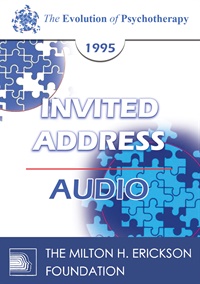
- Average Rating:
- Not yet rated
- Topic Areas:
- Invited Addresses | Reality Therapy | Psychotherapy
- Categories:
- Evolution of Psychotherapy | Evolution of Psychotherapy 1995
- Faculty:
- William Glasser, MD | Arnold Lazarus, Ph.D.
- Duration:
- 1:27:53
- Format:
- Audio Only
- Original Program Date:
- Dec 17, 1995
- Short Description:
- Reality Therapy is completely based on control theory psychology. Dr. Glasser will explain this psychology and then explain how all the techniques of this therapy arise from control theory. The major techniques he will explain are 1) All we do from birth to death is behave; 2) All behavior discussed in therapy is chosen; 3) All behavior is made up of four closely related components: acting, thinking, feeling and physiology; 4) While problems may originate in the past, they all occur in the present; 5) When problems are solved, it is because in the process of therapy, clients are taught to make better choices than they are making when they begin therapy.
- Price:
- $15.00 - Base Price
Please wait ...

